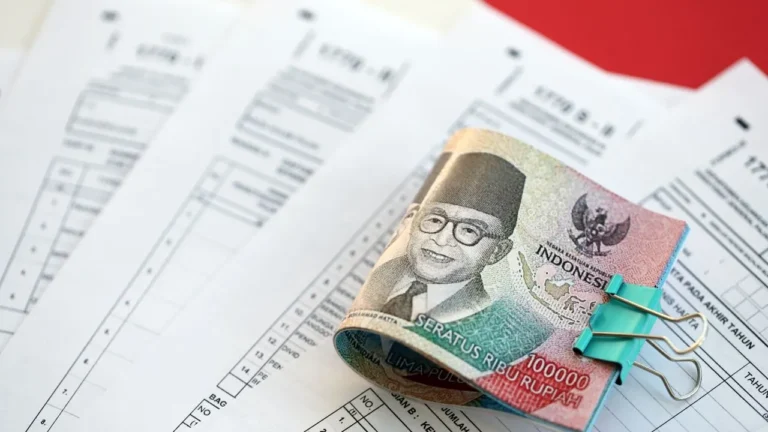Table of Contents
ToggleIn this article, we’ll review the key aspects of property taxation in Indonesia, focusing on rental income, land and building tax, and income tax implications for property owners. Those tax rates are important to know before leasing or purchasing a property in Indonesia.
Property taxation in Indonesia and Bali
BPHTB – Sales and purchase tax
When it comes to settling a buying property transaction, both parties have some tax obligations. The first one is the land acquisition tax or Bea Pengalihan Hak atas Tanah dan Bangunan (BPHTB). The buyer and seller have to pay the tax before the notary signs the deed. Land and tax is calculated at a flat rate of 5% for the buyer (the seller pays an income tax PPH at 2.5%).
The tax for the buyer is calculated as follow. The calculation of the tax varies from a region to another one based on the non-taxable real estate objects, called Nilai Perolehan Objek Pajak Tidak Kena Pajak (NPOPTKP) that is deducted from the Tax Object Acquisition Value, called Nilai Perolehan Objek Pajak (NPOP).
BPHTB = 5% x (NPOP – NPOPTKP)
Let’s take an example for a property sold at 3 000 000 000 IDR in Jakarta. The NPOP is then equal to 3 Billion IDR.
The government is fixing the NPOPTKP at Rp 100,000,000 IDR in Jakarta the calculation becomes:
5% x (Rp 3,000,000,000 – Rp 100,000,000) = Rp 145 000 000
PBB – Land and Building Tax
One of the property taxes in Indonesia is PBB. The land and building tax in Indonesia (Pajak Bumi dan Bangunan) is with a maximum national rate of 0.5%. Each region in Indonesia defines its own rate.
The local government determines:
The NJOP (Nilai Jual Objek Pajak) that can be described as the sales value of the property. This amount is the average price obtained during the last real estate transaction. If there has not been a real estate transaction recently, the NJOP is determined by the local government by comparing the property on the market.
NJKP (Nilai Jual Kena Pajak) is the appraisal value from a calculation using the NJOP.
- 40% for properties above IDR 1 billion
- 20% for properties under IDR 1 billion
To make it simple, if the property transaction is at 2 000 000 000 the PBB tax will be 20% x 2 000 000 000. The final tax will be 0.5% x 20% x 2 000 000 000 = 20 000 000 IDR.
PPH – Income tax and Lease tax in Indonesia
Lessors are responsible for this tax. The tax is based on the lease value. The amount of the lease tax in Bali is at 10%. This tax is due after the signature of the lease and the transaction.
In case of freehold property, the income tax from the seller is at 2.5%. The tax is calculated on the value of the income (sales price).
VAT (PPN)
Oftenly missed, buyers may have to pay a VAT on the property called PPN Pajak Pertambahan Nilai. The lessee or the buyer needs to pay the tax when a transaction occurs with a contractor or a developer registered as VAT collector.
The tax rate is at 11%. However this tax doesn’t apply for second hand properties. It is important to check if the seller will collect the VAT for the government and is in right to charge the VAT to you.
Construction tax
- 1.75% for a company with a classification as a small business or for individual with a competency certificate
- 4% if the company has no business qualification
- 3.5% for a company declaring itself designing and managing the building project as a developer (6% if the company has no business qualification)
PPH is due by the contractor except if the client is a company with a tax number in Indonesia. In this case the client needs to withhold the tax.
Stamp Duty (DST)
The Payment of Documentary Stamp Tax serves as legal evidence during the signature of the both parties. The standard stamp duty has changed the last few years but is stabilizing at less than 1 USD.

How can we help you?
Property tax compliance and tax planning
For individuals and businesses involved in property transactions, ILA Global Consulting offers expert guidance on property tax planning. We help clients to optimize their tax liabilities while ensuring full compliance with Indonesian tax laws. This includes assistance with Transfer Tax (BPHTB), Land and Building Tax (PBB), and other related taxes.
Transaction structuring
We assists our clients in structuring their transactions in the most tax-efficient manner. By considering the specific details of each transaction, they can provide tailored advice on how to minimize tax exposure while adhering to legal requirements.























